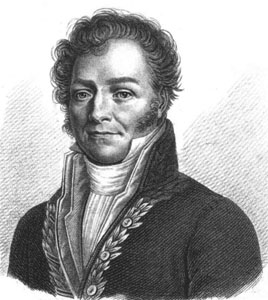| Louis-Jacques Thénard  Born: 4-May-1777 Born: 4-May-1777
Birthplace: La Louptière, France
Died: 21-Jun-1857
Location of death: Paris, France
Cause of death: unspecified
Gender: Male
Religion: Roman Catholic
Race or Ethnicity: White
Occupation: Chemist Nationality: France
Executive summary: Traité de Chimie élémentaire French chemist, born on the 4th of May 1777 at Louptière, near Nogent-sur-Seine, Aube. His father, a poor peasant, managed to have him educated at the academy of Sens, and sent him at the age of sixteen to study pharmacy in Paris. There he attended the lectures of Antoine François Fourcroy and Nicolas-Louis Vauquelin, and succeeded in gaining admission, in a humble capacity, to the latter's laboratory. But his progress was so rapid that in two or three years he was able to take his master's place at the lecture-table, and Fourcroy and Vauquelin were so satisfied with his performance that they procured for him a school appointment in 1797 as teacher of chemistry, and in 1798 one as repétiteur at the École Polytechnique. In 1804 Vauquelin resigned his professorship at the Collège de France and successfully used his influence to obtain the appointment for Thénard, who six years later, after Fourcroy's death, was further elected to the chairs of chemistry at the École Polytechnique and the Faculté des Sciences. He also succeeded Fourcroy as member of the Academy. In 1825 he received the title of baron from Charles X, and in 1832 Louis-Philippe made him a peer of France. From 1827 to 1830 he represented the department of Yonne in the chamber of deputies, and as vice-president of the conseil superieur de l'instruction publique, he exercised a great influence on scientific education in France. He died in Paris on the 21st of June 1857. A statue was erected to his memory at Sens in 1861, and in 1865 the name of his native village was changed to Louptière-Thénard.
Above all things Thénard was a teacher; as he himself said, the professor, the assistants, the laboratory -- everything must be sacrificed to the students. Like most great teachers he published a textbook,. and his Traité de Chimie élémentaire, théorique et pratique (4 vols., Paris, 1813-16), which served as a standard for a quarter of a century, perhaps did even more for the advance of chemistry than his numerous original discoveries. Soon after his appointment as repétiteur at the École Polytechnique he began a lifelong friendship with Joseph-Louis Gay-Lussac, and the two carried out many researches together. Careful analysis led him to dispute some of Claude-Louis Berthollet's theoretical views regarding the composition of the metallic oxides, and he also showed Berthollet's "zoonic acid" to be impure acetic acid (1802); but Berthollet, so far from resenting these corrections from a younger man, invited him to become a member of the Société d'Arcueil. His first original paper (1799) was on the compounds of arsenic and antimony with oxygen and sulphur, and of his other separate investigations one of the most important was that on the compound ethers, begun in 1807. His researches on sebacic acid (1802) and on bile (1807), and his discovery of peroxide of hydrogen (1818) also deserve mention. The substance known as "Thénard's blue", he prepared in 1799 in response to a peremptory demand by J. A. Chaptal for a cheap coloring matter, as bright as ultramarine and capable of standing the heat of the porcelain furnace.
Most of Thénard's memoirs, a list of which may be found in the Royal Society's Catalogue of Scientific Papers, were published in the Annales de Chimie et de Physique, the Mémoires d'Arcueil, the Comptes Rendus and the Mémoires of the Academy of Sciences.
Teacher: École Polytechnique, Paris
Professor: Collège de France
Do you know something we don't?
Submit a correction or make a comment about this profile
Copyright ©2019 Soylent Communications
|